Partnership between China and Russia growing
Rep. Mike Gallagher has the latest on anti-U.S. threats and possible future invasion of Taiwan on ‘The Story.’
EXCLUSIVE: China could invade Taiwan within the next 18 months, current and former officials familiar with U.S. and allied intelligence told Fox News, suggesting a particularly "dangerous" window between the meeting of the National Congress of the Chinese Communist Party this November and the next U.S. presidential election in 2024.
Two former senior officials told Fox News that the intelligence suggests China sees the potential opportunity for an amphibious assault and military invasion of Taiwan in that time frame.
"We have always had and always been aware that China has an ever-present, ever-evolving plan for an amphibious assault and military invasion of Taiwan. If they are not successful in reunifying politically, then they will do so with force," one former senior intelligence official familiar with U.S. intelligence, and who has discussed intelligence belonging to a U.S. ally in the Indo-Pacific, told Fox News.
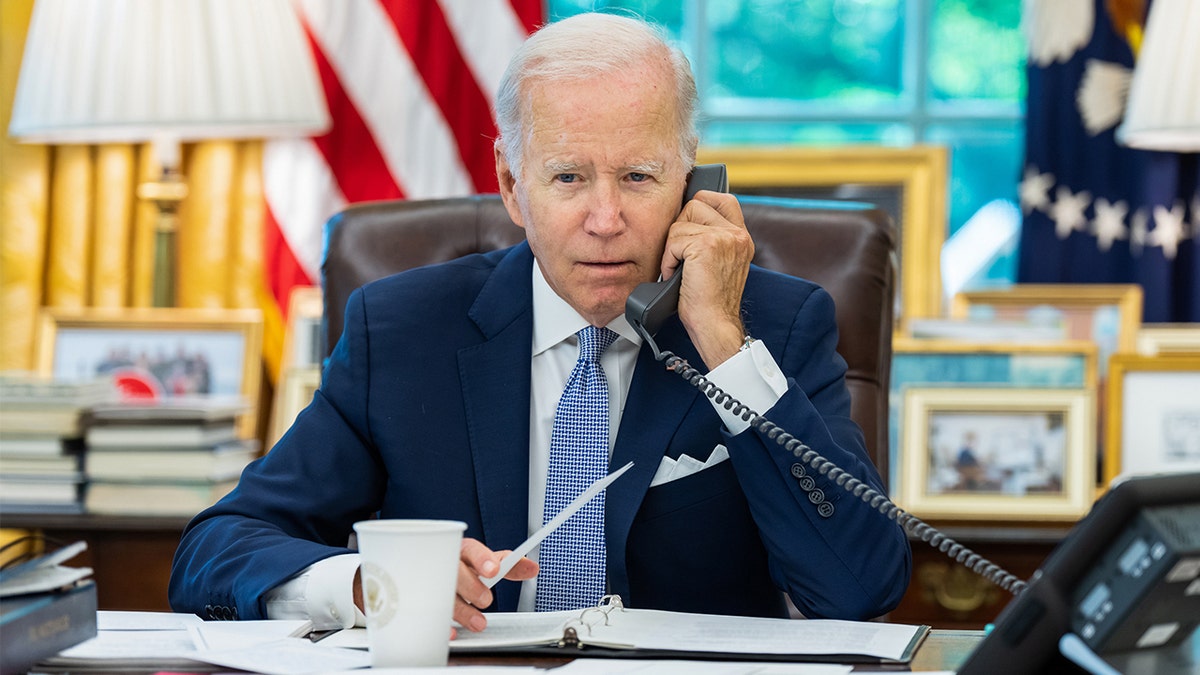
President Biden posted a photo of him speaking on the phone after a call with Chinese President Xi Jinping, July 28, 2022. (White House)
"What is different now is, we have intelligence that this has gone from an indefinite, nebulous scenario, to a belief that there is a window of opportunity in the next 18 months," the official continued. "I don’t think that’s a coincidence that window of opportunity is within a Biden administration."
A former senior Trump administration official told Fox News House Speaker Pelosi’s visit to Taiwan is being used as a "pretext" for increased Chinese aggression around Taiwan, but said it is "not the real cause of it," and warned that the "Davidson Window" is "closing."

U.S. House Speaker Nancy Pelosi, center pose for photos after she arrives in Taipei, Taiwan, Tuesday, Aug. 2, 2022. Pelosi arrived in Taiwan on Tuesday night despite threats from Beijing of serious consequences, becoming the highest-ranking American official to visit the self-ruled island claimed by China in 25 years. (Taiwan Ministry of Foreign Affairs via AP)
Former commander of American forces in the Indo-Pacific Adm. Philip Davison testified last year that China could invade Taiwan within the next six years—by 2027.
"The window is now between the Party Congress and the next U.S. presidential election," the official said noting that window could close by January 2025—at the end of the presidential transition period. "I think we are in a very dangerous two-year window right now."
The 20th National Congress of the Chinese Communist Party is expected to take place in November, where Chinese President Xi Jinping is expected to be re-elected.
A spokesperson for the White House National Security Council told Fox News that the United States "will not seek and does not want a crisis."
"We are prepared to manage what Beijing chooses to do. We will not engage in saber-rattling, and we're not looking to escalate," the NSC spokesperson told Fox News. "At the same time, we're going to be steady and resolute. We will not be deterred from operating in the seas and skies of the Western Pacific as we have done for decades."
The spokesperson added that the United States "will continue to support Taiwan, consistent with our commitments under the Taiwan Relations Act, and defend a free and open Indo-Pacific."
"We're communicating closely with our allies and partners. And we are maintaining open lines of communication Beijing," the spokesperson said. "We will keep doing what we are doing -- supporting cross-Strait peace and stability."
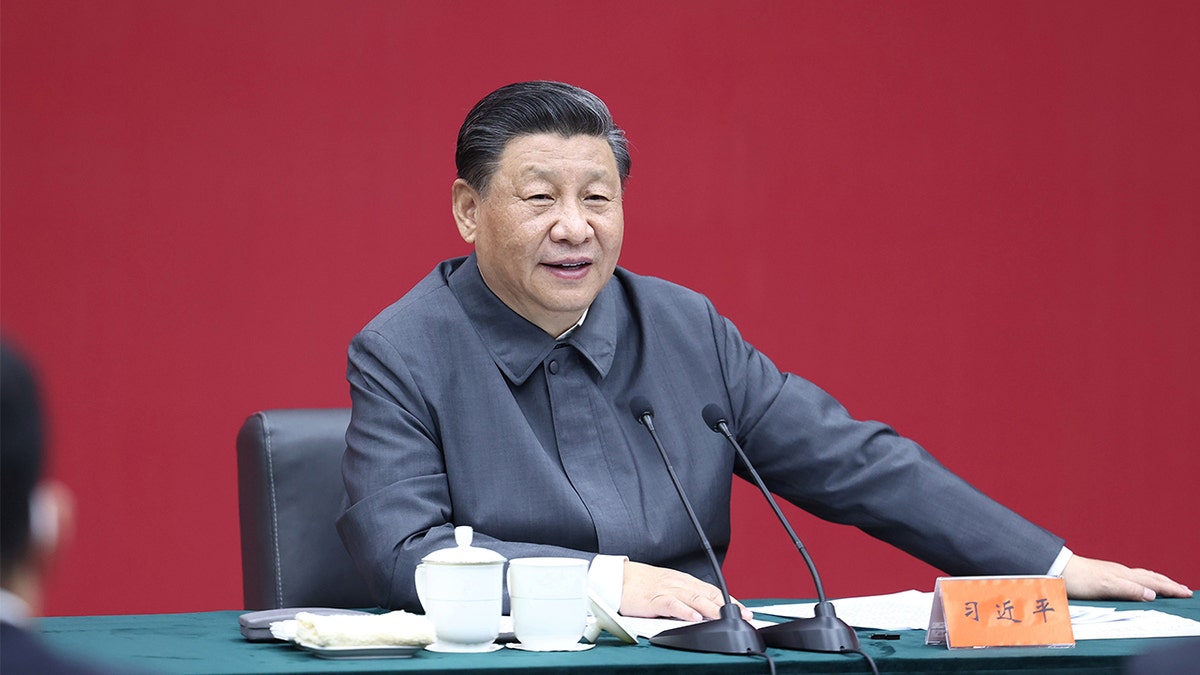
Chinese President Xi Jinping, also general secretary of the Communist Party of China Central Committee and chairman of the Central Military Commission, sits down with representatives of teachers and students at a symposium and delivers an important speech during a visit to Renmin University of China in Beijing, capital of China, April 25, 2022. (Ju Peng/Xinhua via Getty Images)
However, the former senior Trump administration official told Fox News that "the likelihood of invasion has increased dramatically with China perceiving the United States is in a weakened position," pointing to the Biden administration’s "surrender" of Afghanistan to the Taliban in August 2021 and Russia’s invasion of Ukraine, which resulted "in only half-measure sanctions being put on the Russian Federation."
The official also said Xi has been emboldened by U.S. "domestic problems," including crime in cities across the nation, "the lack of control" at the Southern border, and the "failures" of the Biden administration’s energy policy.
The official stressed that the invasion could happen before the inauguration of the next president in 2025, saying China fears the election of "another leader that could return to a more robust, ‘peace through strength’ foreign policy and stronger domestic policies."
With regard to criticisms of the current administration's foreign policy and its withdrawal from Afghanistan, a Biden administration official told Fox News that China "would love nothing more than for the U.S. government to still be bogged down in a 20-year war, still committing billions of dollars, U.S. troops, and have our military focused on another country's civil war.
"By being able to withdraw our forces from Afghanistan, we have been able to reposition them and refocus our efforts to other areas of the world," the official said. The official added that the Biden administration "freed up resources" and said leaving Afghanistan put the United States "in a much better position on the geopolitical stage when it comes to our strategic competition with China or with any other important issues around the world."
However, during an interview with Fox News Wednesday, Former Deputy Assistant Secretary of Defense for East Asia Heino Klinck said the United States "has failed to deter adversaries within the last 18 months."
"If anything, the United States has been deterred from forcefully supporting its partners and allies worldwide," Klinck said, adding that he has viewed 2024 as a "particularly dangerous year."
"The reason is because it is not only the election in the United States, but it is also the presidential election in Taiwan," Klinck said, stressing that he believes the People’s Liberation Army "will move against Taiwan when the Chinese Communist Party tells it to, regardless of timing."
"I view 2024 as being dangerous because I believe the CCP, particularly President Xi Jinping, will see it as a potential window of opportunity because of the U.S. election, and the fact that he probably perceives that the United States is going to shy away from an international crisis during a presidential election," he told Fox News.
Klinck, who also formerly served as a U.S. military attaché at the U.S. embassy in Beijing, currently serves as a senior advisor to the National Bureau of Asian Research.
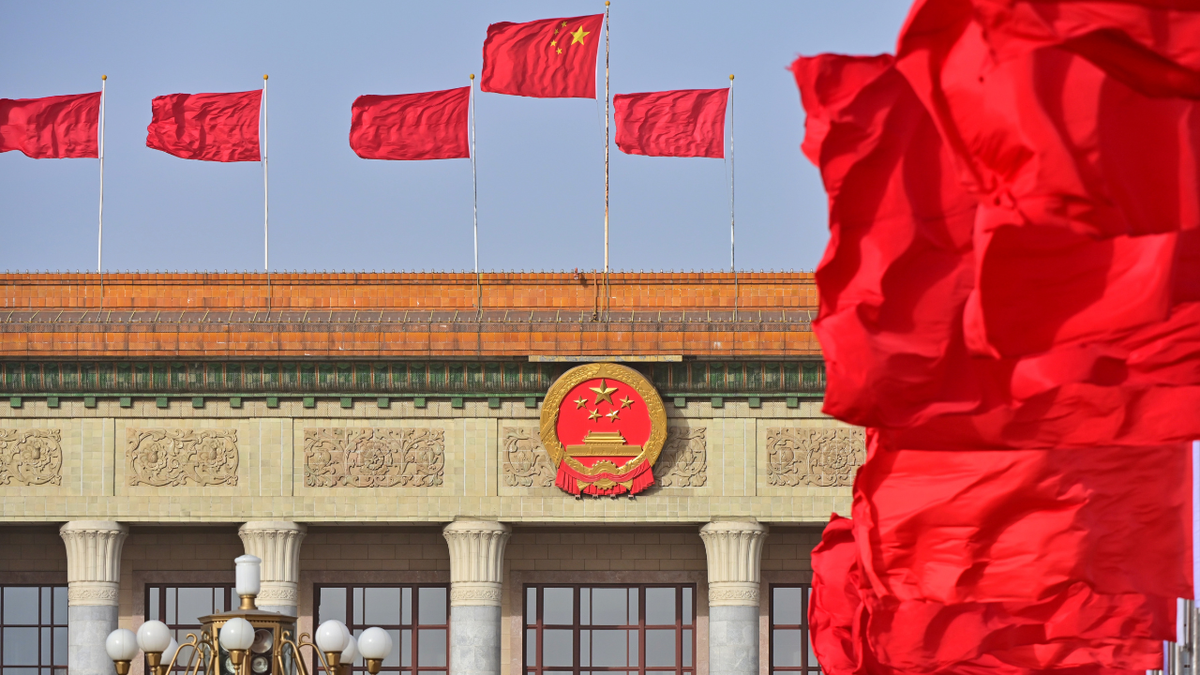
Red flags flutter in front of the Great Hall of the People before the annual two sessions on March 4, 2022 in Beijing, China. The fifth session of the 13th National Committee of the Chinese People's Political Consultative Conference (CPPCC) opens on March 4. (Photo by VCG/VCG via Getty Images)
"I also believe he perceives that the presumptive next Taiwanese president is going to move Taiwan closer to independence," he said.
CHINA POSES 'BIGGEST LONG-TERM THREAT TO ECONOMIC AND NATIONAL SECURITY,' FBI DIRECTOR WRAY WARNS
Current Biden administration officials told Fox News that the situation is fluid and that they are monitoring closely as China gears up for "potential escalation." Officials said they are looking to see how the situation will play out over the coming months and how far China will go.
Officials say they are focusing on what the heightened threat could mean for Taiwan, for U.S.-Chinese relations, and for certain critical industries that could be impacted.

People's Liberation Army launches joint military operations around Taiwan island. China resolutely defends its sovereignty and territorial integrity. (People's Liberation Army, China)
White House National Security Council coordinator for strategic communications John Kirby said Tuesday that even before Pelosi’s visit to Taiwan this week, Beijing "positioned itself to take further steps, and we expect that they will continue to react over a longer-term horizon."
At this point, the Chinese have declared several closure areas around Taiwan for military exercises, and Klinck told Fox News that some of those closure areas "encroach upon Taiwanese territorial waters."
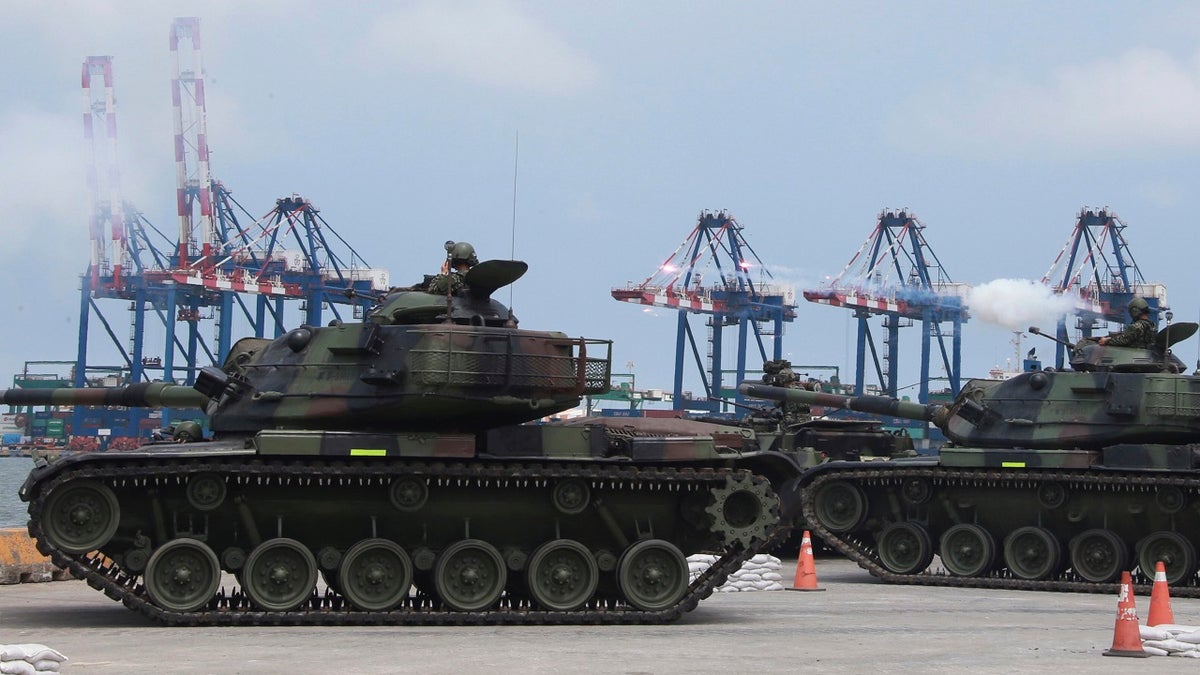
FILE - In this photo released by the Taiwan Ministry of National Defense, Taiwan military forces conduct anti-landing drills during the annual Han Kuang military exercises near New Taipei City in Taiwan on Wednesday, July 27, 2022. (Taiwan Ministry of National Defense via AP, File) (Taiwan Ministry of National Defense)
Klinck told Fox News that this is the first time the military exercises are taking place east of Taiwan.
"The Chinese are trying to say to Taiwan, you don’t have any territorial waters because you belong to us, and they are going to make the point now by conducting exercises there, and they have never done that before," Klinck said. "They have previously declared closure areas and conducted exercises there. They have never done it though on the east side of Taiwan."
Biden administration officials have been warning for months of increased Chinese aggression, with one top Pentagon official last month sounding the alarm that it is "only a matter of time" before a "major incident or accident" occurs in the Indo-Pacific.
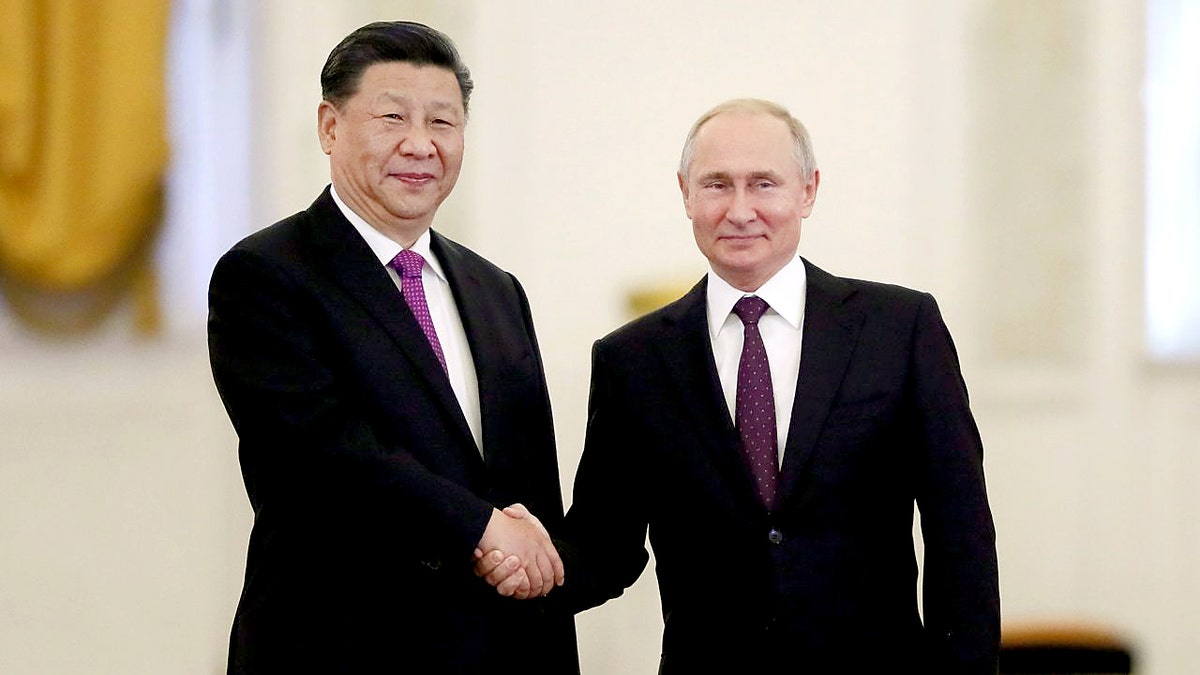
Russian President Vladimir Putin shakes hands with his Chinese counterpart Xi Jinping at the Kremlin in Moscow, Russia, June 5, 2019. REUTERS/Evgenia Novozhenina/Pool (REUTERS/Evgenia Novozhenina/Pool)
Assistant Secretary for Defense for Indo-Pacific Security Affairs Ely Ratner said last month that the Pentagon has witnessed a "sharp increase" in aggressive behavior by the PLA in the Indo-Pacific, admitting that it has "increased dramatically, with dozens of dangerous events in the first half of this year alone."
The warnings from the Pentagon come just days after Chairman of the Joint Chiefs of Staff Gen. Mark Milley directed his staff to collect information on interactions between the U.S. and Chinese militaries in the last five years.
The directive also comes as top intelligence community officials are warning of the threat Beijing poses to the U.S.
FBI Director Christopher Wray earlier this month said China poses the "biggest long-term threat" to U.S. economic and national security.
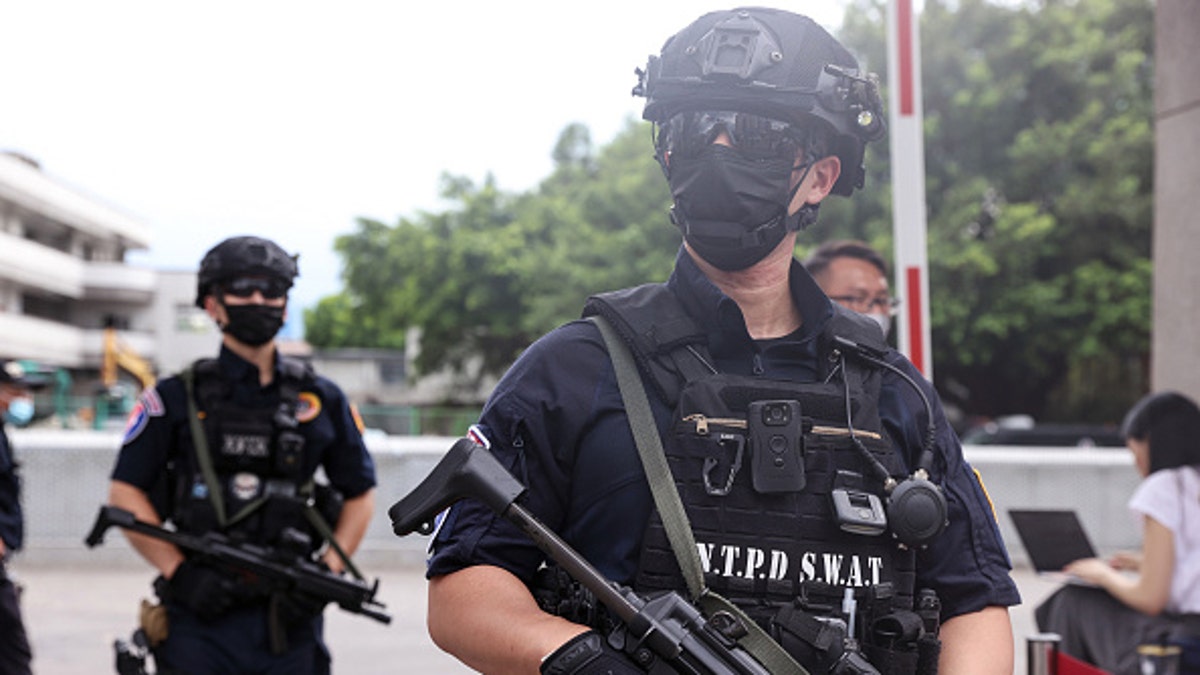
Taiwanese police officers on heightened alert after Taiwan is hit with multiple cyber attacks. Picture taken at the Jing-Mei Human Rights Memorial and Cultural Park in Taipei, Taiwan, on Wednesday, on Aug. 3, 2022. ( I-Hwa Cheng/Bloomberg via Getty Images)
The National Counterintelligence and Security Center also this month warned that state and local leaders are at "risk" of being "manipulated" to support "hidden" agendas by the Chinese Communist Party as China seeks to target officials outside of Washington to lobby for Beijing-friendly policies at the federal level.
CLICK HERE TO GET THE FOX NEWS APP
In April, CIA Director William Burns issued a similar warning to Wray’s — also noting that China has been "a silent partner" in Russian President Vladimir Putin’s aggression in Ukraine.
Burns, at the time, said China is "in many ways, the most profound test the CIA has ever faced," calling China a "formidable competitor lacking in neither ambition nor capability."














































